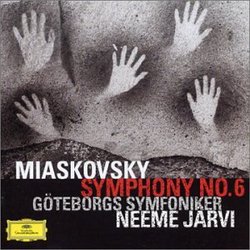| All Artists: Nikolay Miaskovsky, Neeme Järvi, Gothenburg Symphony Orchestra Title: Miaskovsky: Symphony 6 Members Wishing: 0 Total Copies: 0 Label: Deutsche Grammophon Release Date: 11/12/2002 Genres: Jazz, Pop, Classical Styles: Easy Listening, Historical Periods, Modern, 20th, & 21st Century, Symphonies Number of Discs: 1 SwapaCD Credits: 1 UPC: 028947165521 |
Search - Nikolay Miaskovsky, Neeme Järvi, Gothenburg Symphony Orchestra :: Miaskovsky: Symphony 6
 | Nikolay Miaskovsky, Neeme Järvi, Gothenburg Symphony Orchestra Miaskovsky: Symphony 6 Genres: Jazz, Pop, Classical
|
Larger Image |
CD Details |
CD ReviewsExciting and gripping: thank you Neeme Järvi! MartinP | Nijmegen, The Netherlands | 01/04/2003 (5 out of 5 stars) "Until recently my acquaintance with Miaskovsky was limited to his famous if somewhat long-winded cello concerto. Recording companies hardly seem to think it worthwhile to let this prolific symphonist (27 of them!) share the limelight with his near contemporaries Shostakovich and Prokofiev. How wrong they are - and praise to Järvi for bringing Miaskovsky to the attention of a high profile label like DG! This symphony, dating from the 1920's, is absolutely fascinating! No trace here of the meandering monotony of the aforementioned concerto: this piece is full of emotional highs and lows, contained within large-scale but well thought out symphonic movements, and expressed with a mastery of orchestration that is second to none. Don't be scared off by the brutally dissonant opening; soon enough the anger subsides into beautifully harmonized, melancholy sighs, which in turn yield to a capricious yet songful theme on horns and trumpets, that is in fact something of an idée-fixe for the symphony.
The scherzo is an orchestral whirlwind enclosing a serene trio section with a more than passing likeness to some quieter passages in Mahler's Sixth, as the booklet rightly observes. After another stormy opening full of thematic reminiscences to the previous movements, the Andante settles into lush romantic ardour with a surprisingly Howard Hanson like flavour. For the Finale Miaskovsky has another trick up his sleeve: he lets it burst in with a shameless non-sequitur, a radiantly diatonic moment of refuge amidst all the chromatic dissonances; it sounds like a page straight out of Respighi's 'Pini di Roma', followed by a folksy, somewhat Schubertian march, though in fact both themes derive from French revolutionary songs. The joy is short-lived, and plunges into darkness with a rendering of the Dies Irae sinister enough to put Berlioz and Rachmaninov to shame. Desperate orchestral sighs ensue (an augmented version of those in the first movement), and then the clarinet intones a Russian orthodox chant, achieving an emotional effect similar to the appearance of the Bach chorale in Berg's Violin Concerto. Eventually both the sighs and the chant are taken up by the chorus - which is apparently optional, though to my mind something very essential would go lost without it. This is the apex of the symphony, and the startling, wordless entry of the human voices is tremendously effective in marking it (and reminded me very much of Vaughan Williams's 'Antarctica', by the way). The chant is intoned quietly, and the symphony ends peacefully, with violins floating upwards through luminous harmonies.You may have noted that quite some similarities with other composers' works are mentioned in the above. Maybe that is related to Miaskovsky's position as a minor composer just beyond the limelight. Though undeniably an expert craftsman and a sincere artist, he does not posses a very clearly identifiable voice of his own. Which is not meant to imply that this symphony is just derivative patchwork. It is nothing of the kind, which may be clear from the fact alone that half of the works I was reminded of were written AFTER this Sixth! And, as said before, even it isn't utterly individual, this still is gripping, sincere music that has true depth and will not bore anyone with some musical feeling for a single minute of its 64 minute span (which is more than can be said of most of Respighi's oeuvre, or even of Richard Strauss's orchestral works - which goes to show that the better-KNOWN composer is not necessarily the better one). Even if the other 26 of Miaskovsky's symphonies are only two-thirds as good as this one, I will want to get to know them all.This recording, to round things up, really leaves nothing to be desired. The Göteborg Orchestra clearly are a group that deserves far more international exposure: they play magnificently. Though I have no comparative versions, Järvi's view of the work sounds well-paced, urgent at times, but never hard-driven. The recording quality is excellent, offering a very detailed and differentiated sound picture, which is real boon with a work this complex and using such a large orchestra. The dynamic range is ample. In short, very highly recommended!" |

 Track Listings (4) - Disc #1
Track Listings (4) - Disc #1